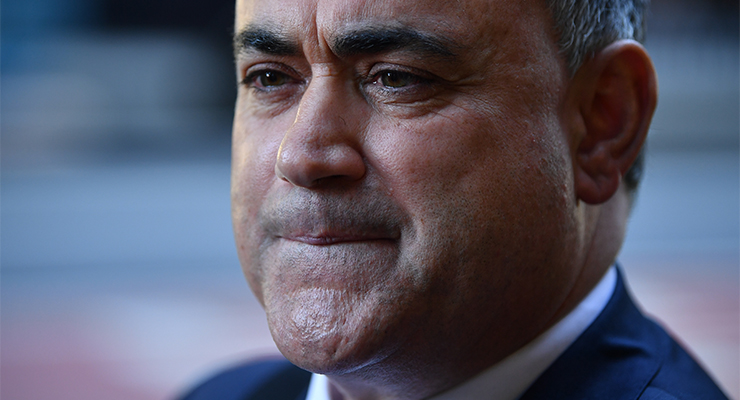
The Federal Court has ordered tech giant Google to pay former NSW deputy premier John Barilaro $715,000 in damages over two YouTube videos on friendlyjordies’ account.
The former politician sued Google over a “relentless, racist, vilificatory, abusive and defamatory campaign” carried out against him on YouTube for more than a year.
Friendlyjordies, aka Jordan Shanks, settled a parallel Federal Court case with Barilaro in November 2021 over the same videos, with Shanks paying Barilaro $100,000, editing the videos and providing an apology.
Legal experts are saying that Barilaro’s win shows publishers need to start taking Australian defamation laws seriously.
Who are we talking about here?
Google is an American multinational tech company that owns YouTube, a video-sharing and social media platform with more than 2.6 billion active users worldwide. YouTube’s main source of revenue is advertising (ads before and during user-generated videos), as well as subscriptions.
John Barilaro is the former MP for Monaro, former leader of the NSW Nationals and former NSW deputy premier. He retired in October 2021, just days after former NSW premier Gladys Berejiklian’s departure.
Barilaro, who dubbed himself Pork-barrel-aro (a reference to his penchant for pork-barrelling), had come under parliamentary scrutiny over his administration of grants programs to regional NSW, but upon his retirement, refused to say whether he was under investigation by the Independent Commission Against Corruption. He cited the toll his defamation action against Shanks had taken on him as playing a big part in his retirement.
Jordan Shanks, aka friendlyjordies, is an Australian YouTuber and comedian whose content focuses heavily on political commentary. He makes money from live shows, Patreon memberships (a subscription service for content creators), and receives revenue directly from YouTube for advertisements played over his videos on the platform.
What were the videos?
The videos at the centre of the case were titled “bruz” and “Secret Dictatorship”, and were published on the friendlyjordies channel in late 2020. Both videos are still up on YouTube with minor edits following Shanks-Markovina’s settlement.
The two videos label Barilaro a corrupt con man (without evidence), call him “greasy”, “greasy little scrotum”, “corrupt” and include racial slurs.
What was the ruling?
Justice Steven Rares found the videos constituted a “relentless and vicious campaign against Mr Barilaro” and that the videos caused a traumatised Barilaro to end his career. He found that Google “made a considered decision” to keep the videos online, even after Barilaro had complained about them, as the tech giant was motivated by profit.
“Google encouraged and facilitated Mr Shanks in his vitriolic, obsessional, hate filled cyberbullying and harassment of Mr Barilaro both before and after Mr Shanks settled the defamation claims against him,” the judgment read.
“He [Shanks] needed YouTube to disseminate his poison. Google was willing to join Mr Shanks in doing so to earn revenue as part of its business model.”
The two videos have a combined viewership of 1.3 million and brought in thousands of dollars of ad revenue since they were posted in 2020.
The normal “cap” on defamation damages where economic loss has not occurred is $425,000. However, the Federal Court went significantly past this in ordering Google to pay more than $700,000 in damages.
Why is this significant?
Australia is one of the few countries where online platforms have the same legal responsibilities regarding defamation as publishers do after a landmark case in 2021 found a newspaper was liable for defamatory comments below an article posted on Meta’s Facebook.
That publishers (such as Google, Meta, etc) are liable for content they host online has been law in Australia for some time now, but most major tech companies have pushed back against this in some form or another.
Legal academic Michael Douglas told the ABC that “Google has been at pains around the world to argue that it’s not responsible for things on its various platforms … and that courts shouldn’t shoot the messenger”.
Justice Rares has also said he would refer both Google and Shanks-Markovina for possible contempt of court charges over “improper pressure” placed on Barilaro during the case.








Filter through the silly name calling that Shanks plies in his Youtubes (for his target demographic I suppose…) and it’s not difficult to pause and wonder the many plausible reasons why Barilaro threw in the towel only days after after Berejiklian resigned with ICAC hot on her heels.
Filter through the silly name calling and notice the dark anger and agression Shanks exudes.
His targets may not be virtuous, and Shanks may ring some bells with his biting criticisms, but his energy is so nasty I stopped watching.
Barilaro probably has many things which wouldnt bear too much scrutiny from an independant observer weighing up the rights and wrongs of things. Im sure he would like to keep those quiet. In my view he took a risk going to court because things often come into the light that you prefer to keep hidden in these cases. Paid off here though, no skeletons escaped their cupboards and a big payout as well. Happy days.
The story here is not whether or not ‘platforms’ are ‘publishers’. It is the anachronistic, inconsistent and incoherent defamation laws across all Australian jurisdictions. What precisely is ‘reputation’? And where everyone has wildly varying reputations because it is a product of the aggregated views of other, what truly is the value of any such reputation. Cases heard by judges who in general personally hold the elusive concept of ‘reputation’ sacrosanct are then decided from the citadel of reputation maintained by judges. What a nonsense, a nonsense that continues to inflict damage on society, not just defendants.
Judges who belong to the same gentleman’s clubs as the people claiming their reputation has been destroyed.
Worse, withstanding the defamatory issues, does this not open the door up to SLAPPs ‘Strategic Lawsuits Against Public Participation’ used by powerful players to shut down speech by taking legal action against both the creator and publisher?
SLAPPs have plagued the US, EU and UK, but all have or are planning restrictions on their use due they being used to protect the powerful, and shut down not just freedom of speech but also factually based reporting.
Unfortunately in Australia we do not seem to have any system for the media to hold power to account anymore?
$815,000 is non-tax payer money well spent to rid us of our local koala tickler that led to the poor petal retiring. Cheers to Google and friendlyjordies from all of us here in Burra. Our koalas can sleep comfortably in their trees at night & day…